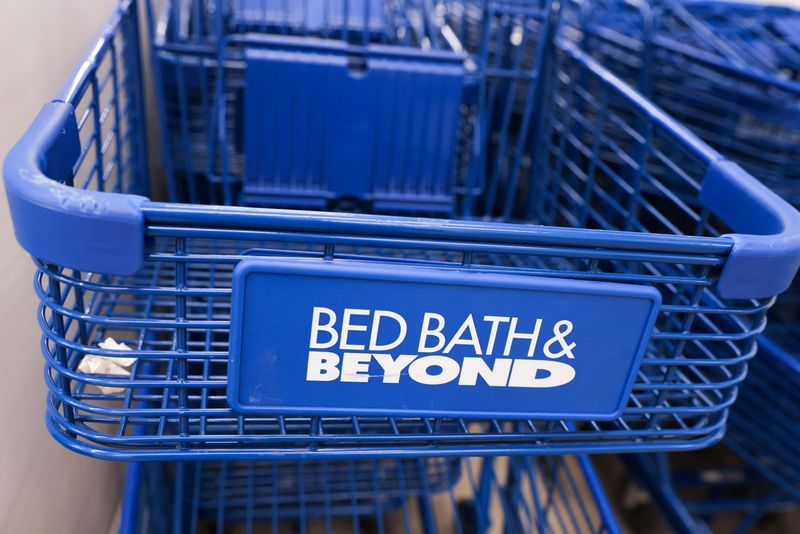By Arriana McLymore and Deborah Mary Sophia
(Reuters) -Bed Bath & Beyond Inc on Tuesday reported a much wider-than-expected quarterly loss and sales that plunged by a third, failing to halt the months-long cash burn that led to warnings of a possible bankruptcy.
The home goods seller has been struggling with a dwindling cash pile as vendors have demanded payments more swiftly even as a pandemic-led surge in demand for home decor has slumped as the economy has slowed.
Bed Bath & Beyond (NASDAQ:BBBY) said last week it was exploring options, including bankruptcy, after years of weakening sales. It took on $375 million in financing in August but failed this month to convince bondholders to swap out their investments for new debt.
Last year, the company said it would close 150 stores and lay off 20% of its corporate and supply chain workforce among other cost-saving measures.
The company did not indicate on Tuesday whether it would file for bankruptcy protection, but said it will lay off more employees to reduce costs. It said it had started cost cuts of about $80 million to $100 million across the business.
Morningstar analyst Jaime Katz said she expects a bankruptcy filing in the first half of 2023, noting "the unwillingness of lenders to participate in a debt swap" as evidence they were unlikely to take on more risk.
To help navigate options, the company has enlisted C Street Advisory Group LLC, a corporate strategy and communications firm founded by former Kirkland & Ellis LLP restructuring lawyer Jon Henes, people familiar with the matter told Reuters.
Bed Bath & Beyond is also being advised by turnaround and consulting firm AlixPartners LLP, investment bank Lazard (NYSE:LAZ) Ltd and Kirkland, Reuters previously reported.
Bed Bath & Beyond did not immediately respond to a request for comment on the hiring of C Street. The company previously declined to comment on other specific advisers it hired.
Bed Bath & Beyond did not take questions from analysts on its Tuesday conference call "in light of the ongoing review of strategic alternatives," said Susie Kim, head of investor relations.
Its shares gained 27.8% to close at $2.07 on Tuesday as retail investors speculated it could be a potential acquisition target and as short-sellers closed out bets.
Short sellers borrow shares to bet on declines. Buying back stock when closing a bet can help boost the share price.
LOSS WIDENS
The Union, New Jersey-based company's net loss for the fiscal third quarter ended Nov. 26 widened to $393 million from $276.4 million a year earlier. It included a $100.7 million impairment charge, indicating the value of the company's inventory was below its original estimates.
The retailer reported an adjusted loss of $3.65 per share, wider than Wall Street's estimate of a $2.23 per share loss.
Cash and cash equivalents declined steeply to $153.5 million from $509 million, making it challenging for the retailer to secure more merchandise for its stores.
Net sales fell 33% to $1.26 billion.
Foot traffic fell 23.1% in November from the previous year, according to data from Placer.ai.
Inventory fell by a quarter to $1.44 billion in the third quarter, after the retailer shed some of its own brands including Wild Sage and offered steep Black Friday discounts to move merchandise.
Chief Executive Sue Gove said Bed Bath & Beyond did not meet its goals in changing its assortment as it dealt with "credit line constraints" and vendors seeking quicker payments.
"This led to lower receipts and, therefore, lower in-stock levels, in the 70% range, which hampered our sales further in an already competitive environment," Gove said.
The retailer's recent emphasis on private-label brands led it to cut back on orders of nationally branded merchandise, hurting its relationships with some vendors, a former company executive said.
